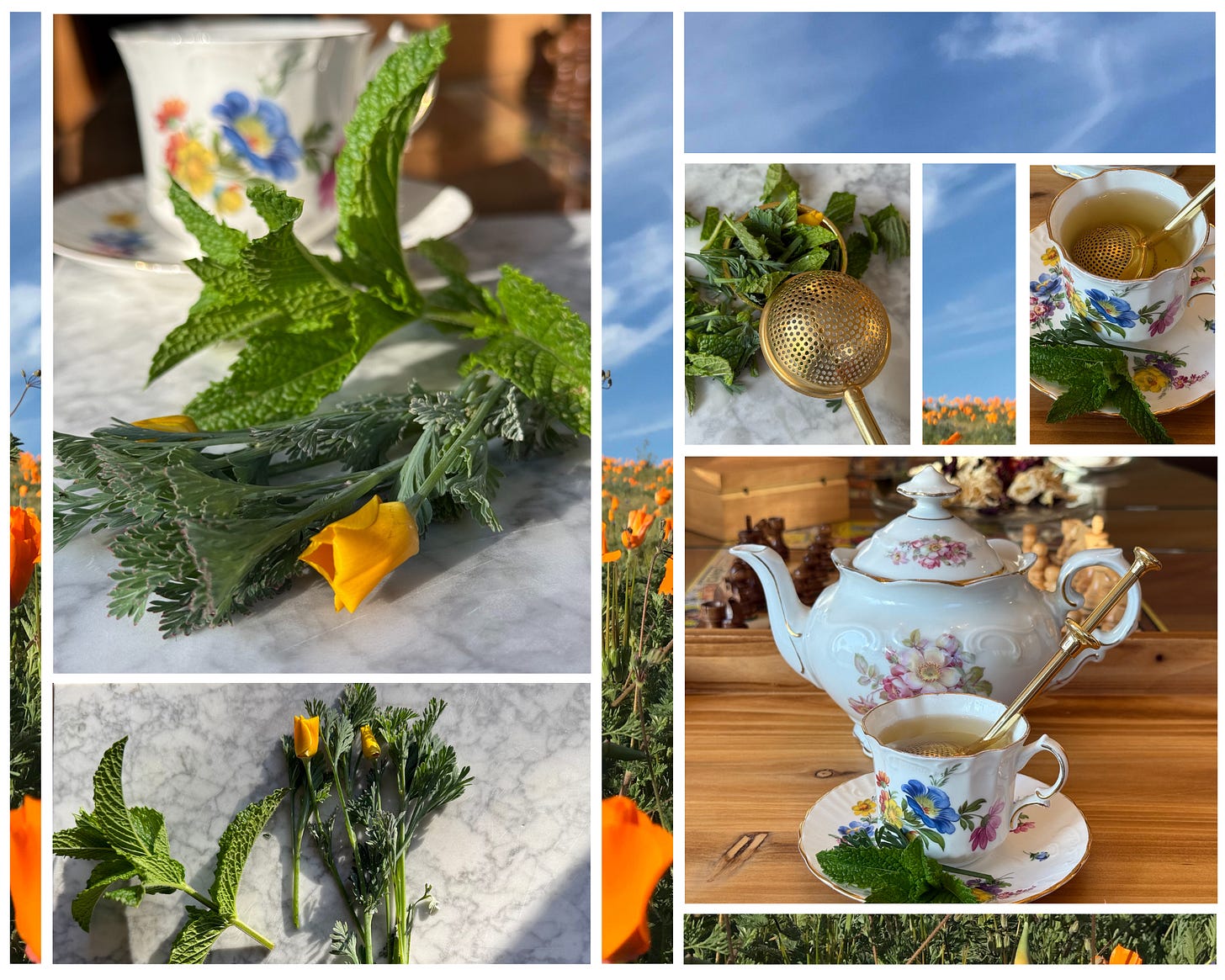I know, I know, I said Gélatine would be for paid subscribers, but let’s be honest, I only have you. Don’t you think you deserve a little of the reserve goo? I think you do. This one is on the house. Bon appétit.
Thank you for being my dear reader!
I Made You Another Mix Tape
I’m really, really into you…
What I’m Growing
While my attention was elsewhere, the garden changed. Nasturtiums vanished. Poppies grew tall, their blossoms became long, heavy seed pods, and the plants lost their vivacious green, adopting a silvery hue and falling flat in tangled heaps. The white blossoms on the berry bramble turned into ripening mauve berries. The roses withered. Lavender put on aromatic spears. The four-foot hollyhock stems were weighed down by their crepe-like champagne double blooms.
The path that had been cleared of weeds was once again stubbled with their tenacious green growth. Pumpkins that I should have transplanted looked near death. Everything was dry, but some plants thrived in the arid conditions, while others wilted; thus, the salvia continued blooming, while the dianthus stood solemn, and the pansies and nasturtiums crisped into dust. I trimmed the dried heads of the cosmos carefully to save their seeds. I collected poppy seeds too- the talon-shaped pods spring open at the lightest touch, making collection extra sporty.
Even the geraniums required attention, a little extra water, and the removal of spent blossoms. The mint was exploding, and tiny young katydids were hunting on the big leaves. It is time to start misting the berry brambles for the young praying manti that would surely appear soon. They have hunted here for generations. There is nothing to do about lost garden time except to get back in the garden and work. Before enlightenment, trim, weed, water, plant, and gather seeds. After enlightenment, trim, weed, water, plant, and gather seeds.
Make it or Fake it
California Dream Tea
Ew, Disclaimers:
California poppies are protected by state law. You can only pick them from your own yard or garden here. You should not drive or operate heavy machinery after drinking this tea. This is way more serious than camomile, so think twice and consult a physician before mixing your home-brewed California Dream Tea with any prescription drugs. One more thing- it’s bitter.
So now that you’ve been warned, why drink this tea? It might wash away the troubles of the day and make you very sleepy. It isn’t poisonous or dangerous. It isn’t the same poppy that opium comes from. And it might be growing in your backyard.
Ingredients
Fresh leaves, stems, and flowers of the California Poppy (Eschscholzia Californica). Just enough to fill your tea ball or basket.
Fresh leaves of mint. One or two sprigs will do.
A drop of honey.
Instructions
Wash all your leaves, stems, and flowers.
Boil some water.
Use kitchen shears to trim your mint and poppy leaves and stems to a size that will be easy to pack into a tea ball or tea basket.
Stuff your trimmed mint and poppy into a tea ball or basket.
Pour hot water over your tea ball or basket in a pretty tea cup or mug. (Make sure your tea vessel is pretty enough. Don’t mess this part up.)
Allow it to steep for at least 3 minutes. You can leave it longer, up to 10 minutes, but your tea will get colder.
Add a little honey to taste. Or be bold, brash, & bitter and skip the honey.
What I’ve been Reading
Great Ideas from the Great Books, Dr. Mortimer J. Adler
My husband inherited his grandparents' books. One particular book from this collection, Dr. Mortimer J. Adler's Great Ideas from the Great Books, was particularly unusual and interesting to us. It is composed of a collection of questions addressed to Adler by readers of his syndicated newspaper column of the same name, and of course, his answers. The column started appearing in major newspapers in 1959, while the first edition of the book was published in 1961. In addition to its vintage, it stood out to us due to the philosophical nature of the questions and the fact that Alder professed to be drawing his responses from the Great Books of Western Civilization.
We would open it at random and read a chapter to stimulate conversation. What did we think about the question and the answer? It was an excellent pairing with red wine in the evening or with pour-over on a lazy Sunday morning. Admittedly, at the time, we had little idea of what this book was or where it came from. We intuited that it was from a column published during the 50s or 60s. I frequently wondered what was meant by the Great Books. It sounded very presumptuous to me.
One day, on my own, I read the introduction of the book, and my mind was blown. The Great Books Movement began during World War II. Adler and his collaborator, Chancellor Robert M. Hutchins of the University of Chicago, started leading adult reading and discussion groups outside of Universities with books that were considered the foundation of a liberal education. The challenge was that many of these books were difficult to obtain in good condition, some were entirely unavailable, and others had never been translated into English.
In 1943, William Benton, who at that time was serving as publisher and chairman at Encyclopaedia Britannica, participated in one of these groups along with 39 other men. He introduced an idea that took hold of their shared imagination. What if a set of great books could be published in the English language, making it widely available to the American public? Wasn’t that a potent way to empower the free world to recognize, face, and overcome the evils so clearly and vividly manifested in the recent World War?
Eight years and 54 volumes later, Britannica’s Great Books of The Western World came into existence. At this first publishing, it included 443 works from 74 authors. Adler himself penned an extraordinary two-volume index called the Syntopicon, dividing “all thought” into 102 basic ideas from “Angel” to “World” and further breaking these ideas into 2,987 topics containing 163,000 exact references to the passages to be found in The Great Books of The Western World collection.
Since reading that introduction years ago, I have dreamed of finding these books in an estate sale or a thrift store. This month, my husband surprised me by ordering a used collection from an online seller. I have volumes 1-32. The rest are lost in the mail. The seller says he is praying for us. Meanwhile, I’ve read volume 1 and can’t wait to tell you about it… next month.
And Now For Some Vintage Jelly
Jelly published elsewhere in 2024…
SUM TOTAL
Bad poems, unfinished homework, abandoned dreams. Unsent letters, fragments of drawing, unrealized objectives, and abilities. Good intentions, scattered like leaves by the unrelenting wind of time. Friendships unexplored, trips planned but never taken, words unspoken or mis-spoken or spoken on deaf ears. Bad hair days, ill-fitting clothing, height, weight, and number of cavities. Things that you wouldn’t post on social media, real things, true things; the only way to be known to another someday when the culture, the civilization, maybe the species is gone. This is what I wanted to give.
I wanted to leave some possible remaining other the color of my eyes, waist measurement, and height. My blemished skin, dry hands, headaches, bad moods, awkward encounters, unpopular opinions, and unproven ideas. A pocketful of dried beans and a buffalo nickel. The striving for meaning, the lack of meaning, the eventual departure from a need for meaning. Unimportance, inability, failures; the trying so hard and losing so hard that the heart cracks open and the spirit is sucked out like the marrow from a bone.
Alexander the Great isn’t the truth. Queen Victoria isn’t the truth. They’re the exception, the ones who leave a mark. Many more, myself especially, are unremarkable. Except. I wish to leave this remark. That I was here. I lived, and dreamed, and laughed, and bled, and feared, and loved as much as I could. I was human. I was not The Great or The Victorious, but I dreamed of the future and affectionately wished to give it all of myself. Not only the lovely, excellent parts. That would be selfish of me. I wish to give this too - the crude, common parts. The truth. The entirety. My whole life with all of my love.





